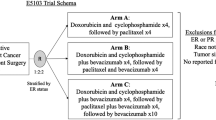Abstract
Purpose
To examine the association between race and clinical outcomes (pathological complete response [pCR]; recurrence-free survival [RFS], and overall survival [OS]) in patients diagnosed with triple-negative (TNBC) or HER2-positive breast cancer treated with neoadjuvant chemotherapy (NAC).
Methods
Patients who self-identified as non-Hispanic white (NHW) or non-Hispanic Black (NHB) and were diagnosed with Stage I–III TNBC (n = 171 including 124 NHW and 47 NHB) and HER2-positive (n = 161 including 136 NHW and 25 NHB) breast cancer who received NAC from 2000 to 2018 at Roswell Park Comprehensive Cancer Center were included. Associations of race with pCR and survival outcomes were evaluated using logistic and Cox regression models, respectively.
Results
There was no statistically significant difference in pCR between NHB and NHW patients with TNBC (31.9 vs 29.8%; OR: 1.11, 95% CI 0.54–2.29) or HER2-positive breast cancer (36.0 vs 39.7%; OR: 0.87, 95% CI 0.36–3.11). After controlling for potential confounders, including age, stage, treatment regimens, insurance status, and comorbidities, no statistically significant difference in OS or RFS was observed between NHB and NHW patients within either subtype.
Conclusion
TNBC or HER2-positive breast cancer patients treated at a single academic center in Buffalo, NY, showed similar outcomes independent of patients’ race. Given the known genetic diversity of African American ancestry in the US, further studies investigating the interplay between race, geography, and clinical outcomes are warranted.



Similar content being viewed by others
References
Breast SEER 5 year survival rates 2011–2017. 2021
Siddharth S, Sharma D (2018) Racial disparity and triple-negative breast cancer in african-american women: a multifaceted affair between obesity, biology, and socioeconomic determinants. Cancers 10(12)
Cortazar P et al (2014) Pathological complete response and long-term clinical benefit in breast cancer: the CTNeoBC pooled analysis. Lancet 384(9938):164–172
Killelea BK et al (2015) Racial differences in the use and outcome of neoadjuvant chemotherapy for breast cancer: results from the national cancer data base. J Clin Oncol 33(36):4267–4276
Tichy JR et al (2015) Race, response to chemotherapy, and outcome within clinical breast cancer subtypes. Breast Cancer Res Treat 150(3):667–674
Dawood S et al (2009) Triple receptor-negative breast cancer: the effect of race on response to primary systemic treatment and survival outcomes. J Clin Oncol 27(2):220–226
Bryc K et al (2015) The genetic ancestry of African Americans, Latinos, and European Americans across the United States. Am J Hum Genet 96(1):37–53
Elston CW, Ellis IO (1991) Pathological prognostic factors in breast cancer. I. The value of histological grade in breast cancer: experience from a large study with long-term follow-up. Histopathology 19(5):403–410
Cserni G (2020) Histological type and typing of breast carcinomas and the WHO classification changes over time. Pathologica 112(1):25–41
Harvey JM et al (1999) Estrogen receptor status by immunohistochemistry is superior to the ligand-binding assay for predicting response to adjuvant endocrine therapy in breast cancer. J Clin Oncol 17(5):1474–1481
Wolff AC et al (2013) Recommendations for human epidermal growth factor receptor 2 testing in breast cancer: American Society of Clinical Oncology/College of American Pathologists clinical practice guideline update. J Clin Oncol 31(31):3997–4013
Balmanoukian A et al (2009) African American women who receive primary anthracycline- and taxane-based chemotherapy for triple-negative breast cancer suffer worse outcomes compared with white women. J Clin Oncol 27(22):e35–e37; author reply e38–9
Usiskin I et al (2021) Association of relative dose intensity with BMI and pathologic complete response in patients treated with neoadjuvant chemotherapy for breast cancer. Breast Cancer Res Treat 186(1):191–197
Zhang L et al (2018) Impact of chemotherapy relative dose intensity on cause-specific and overall survival for stage I-III breast cancer: ER+/PR+, HER2- vs. triple-negative. Breast Cancer Res Treat 169(1):175–187
Warner ET et al (2016) Impact of race, ethnicity, and BMI on achievement of pathologic complete response following neoadjuvant chemotherapy for breast cancer: a pooled analysis of four prospective Alliance clinical trials (A151426). Breast Cancer Res Treat 159(1):109–118
Artiga S, Orgera K, Damico A, Changes in health coverage by race and ethnicity since the ACA, 2010–2018. 2020 March 5th]. https://www.kff.org/racial-equity-and-health-policy/issue-brief/changes-in-health-coverage-by-race-and-ethnicity-since-the-aca-2010-2018/
Masuda N et al (2017) Adjuvant capecitabine for breast cancer after preoperative chemotherapy. N Engl J Med 376(22):2147–2159
von Minckwitz G et al (2019) Trastuzumab emtansine for residual invasive HER2-positive breast cancer. N Engl J Med 380(7):617–628
Schmid P et al (2020) Pembrolizumab for early triple-negative breast cancer. N Engl J Med 382(9):810–821
Griggs JJ et al (2003) Racial disparity in the dose and dose intensity of breast cancer adjuvant chemotherapy. Breast Cancer Res Treat 81(1):21–31
Acknowledgements
Dr. Takabe was supported by United States National Cancer Institute (NCI) grants R01CA251545, R01CA250412, and R37CA248018, and United States Department of Defense Breast Cancer Research Program grants W81XWH-19-1-0674 and W81XWH-19-1-0111. Dr. Ambrosone is a recipient of funding from the Breast Cancer Research Foundation.
Funding
Research reported in this publication was supported by the National Center for Advancing Translational Sciences of the National Institutes of Health under award Number KL2TR001413 and UL1TR001412. The content is solely the responsibility of the authors and does not necessarily represent the official views of the NIH. This research was also supported by the National Cancer Institute Cancer Center Support Grant (P30CA016056).
Author information
Authors and Affiliations
Corresponding author
Ethics declarations
Conflict of interest
The authors declare that they have no conflict of interest.
Ethical approval
This research study was conducted retrospectively from data obtained for clinical purposes. The study was approved by Roswell Park Institutional Review Board.
Additional information
Publisher's Note
Springer Nature remains neutral with regard to jurisdictional claims in published maps and institutional affiliations.
Rights and permissions
About this article
Cite this article
Sarma, M., Perimbeti, S., Nasir, S. et al. Lack of racial differences in clinical outcomes of breast cancer patients receiving neoadjuvant chemotherapy: a single academic center study. Breast Cancer Res Treat 192, 411–421 (2022). https://doi.org/10.1007/s10549-021-06506-y
Received:
Accepted:
Published:
Issue Date:
DOI: https://doi.org/10.1007/s10549-021-06506-y




